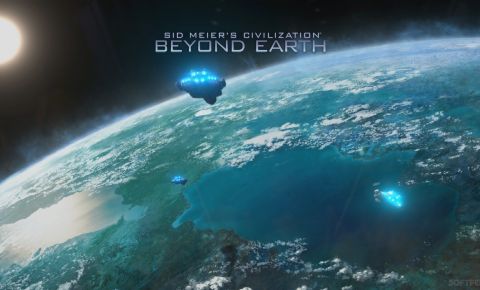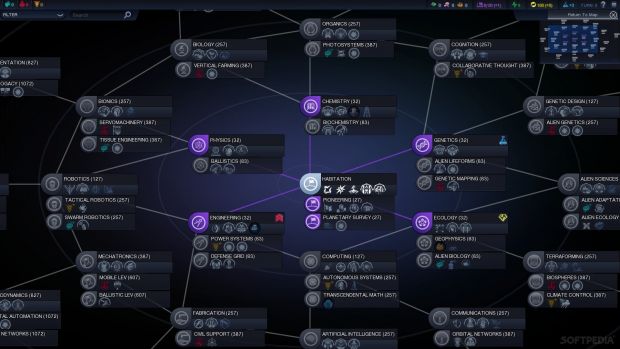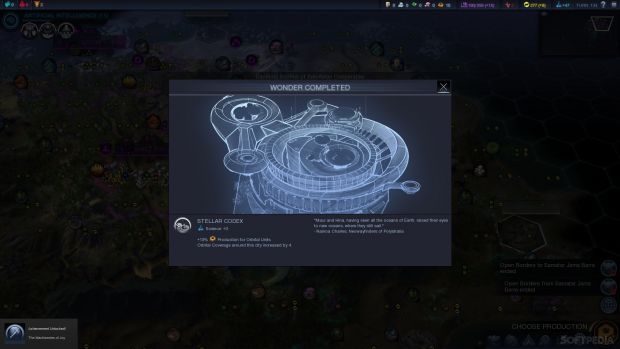Civilization: Beyond Earth is a game where a Siege worm can take out even middle-game units fairly quickly, especially when backed up by a few other smaller alien units, and where the player can decide to re-humanize the survivors of another planetary settlement that worked with advanced robotics.
The experience starts off slow and instills plenty of fear in the player, but progresses towards a situation where the gamer wields a lot of power and can decide the fate of the entire human race, both on Earth and on the new planet.
Civilization: Beyond Earth requires a bit of learning and plenty of trial and error is necessary to discover the best strategies, and Firaxis shows that it knows how to put together a complex strategy experience that has space for both classic ideas and innovation.
Story
Civilization: Beyond Earth is a game about leaving Earth behind as a catastrophe makes it uninhabitable, in order to look for the salvation of the human race, or at least that part of it associated with a particular faction, on an entirely new planet that’s not as hospitable as it could be.
The intro is one of the best that Firaxis has ever created and I appreciate the fact that the company is not too eager to offer details about the past of the included civilizations and focuses more on what they can create when they have the freedom to pursue their own concepts and ideas.
Civilization: Beyond Earth includes eight factions to play as, each with small bonuses, but with none of the personality that infused those included in Alpha Centauri, and the overall atmosphere of the game is clearly inspired by the biggest and best science fiction universes in many ways, with Dune clearly being the source of the siege worms.
Beyond Earth also has small quests for the players, which guide and teach them about the core elements of the game, and there are plenty of decisions to make all through the experience.
Despite the fact that the game is focused on the future, the writing feels a little too conventional and never manages to surprise, especially when compared to the quality of the made-up quotes that were included in Alpha Centauri.
Gameplay
Civilization: Beyond Earth is, at its core, instantly recognizable for all fans of the franchise as a turn-based strategy title that asks gamers to explore, exploit, expand and exterminate in order to reach one of the offered victory conditions ahead of the other factions.
Firaxis clearly wants to make sure that long-term fans quickly understand the new title while also deploying some interesting innovations, and the overall package, despite some small issues, is both engaging and challenging.
The changes made to the Civilization formula start even before the alien planet has been reached, with gamers able to customize their faction by choosing the type of ship they plan to fly, the initial type of colonist and the equipment that will fill the cargo hold.
The trend towards increased specialization can also be seen in the small tweaks that can be gained by completing the quests that Beyond Earth is constantly delivering and in the way the technology system includes more options and asks gamers to choose one direction and stick with it.
The old tree of the series is now a web and it can be a little disorienting at first, but it quickly emerges as one of the best features of the new Civilization title.
Gamers do need to spend time choosing what long-term objective they aim for, and once they do that, it’s easy to chart a path which introduces the best possible bonuses for the gamer’s faction.
To push customization even further, players need to choose an affinity, either Purity, Harmony or Supremacy, which dictates which victory condition they can aim for and shapes the relationships with other factions.
Beyond Earth also offers Virtues, instead of the older government system, and there are times when the possibilities offered by all these choices seem a little bit too broad, which in turn can diminish their impact and their meaning.
Before players can worry about victory and about the evolution of their faction, they need to deal with the more immediate issue of survival and exploration.
The local fauna, culminating with the Manticores and the Siege Worms, is very powerful, and in the early game it’s a good idea to avoid them, and even then, workers and trade units will often be taken by surprise and destroyed.
In classic Civilization fashion, gamers need to carefully scout the planet, decide where they want to drop new cities, secure important resources, and then decide how they want their faction to develop, targeting specific units and wonders.
The AI opponents arrive in staggered fashion and each clearly plays to its own strengths, and it’s important to try and secure some alliances and try to work with those who share one’s affinity, if possible.
I’ve had one entirely peaceful game in Civilization: Beyond Earth, where I only fought a few aggressive aliens, but both Purity and Supremacy approaches require the player to be aggressive at times in order to secure resources and cities.
The AI is not entirely capable of challenging a good player but it does stab you in the back when it needs to and it clearly has a good handle on research, even if its use of military units is sometimes questionable.
One design decision that Civilization V fans might disagree with involves the elimination of the importance of trade goods for population happiness, which tends to simplify diplomatic interactions, and even the new Favors cannot liven them up again.
Affinities and the tech web are the most important elements of Civilization: Beyond Earth because they give the game a means to focus on the efforts of the players, while at the same time showing them the range of possibilities that they can explore in another playthrough.
Graphics and audio
Civilization: Beyond Earth is an interesting looking game, which aims to introduce enough alien elements to satisfy the requirements of the theme, while also giving long-term fans of the franchise plenty of familiar elements in order to make it easy for them to engage with the experience.
The perspective allows for plenty of information to be offered at once, especially in the tech web area, and the animations are beautiful to look at initially, although they do not have a lot of variety, especially for those who plan to engage with the Firaxis title for many hours.
The alien world manages to look both beautiful and threatening at the same time, and it’s a pleasure to see how the various affinity choices affect the way units evolve.
The sound design and music in Civilization: Beyond Earth are also well suited for the theme, although a little more variety to the soundtrack would have been welcomed, but I like the voice used for the various leaders, as it gives them character if they have limited info to work with.
Multiplayer
Civilization: Beyond Earth offers online and hotseat multiplayer, and a variety of settings are offered in order to make sure that groups settle on the type of planet they like before they start competing against one another.
A game that involves a large number of players can take up many hours, which is why such an adventure is probably best attempted with a friend who will honor play sessions without dropping out if they start losing.
The Good
- Affinity system
- Tech web
- Plenty of decisions
The Bad
- Limited story appeal
- Some AI issues
Conclusion
But once the learning curve is disposed of, fans will discover a fresh take on the turn-based strategy genre, which is thoroughly infused with science-fiction themes, questions about the future of humanity and a variety of outcomes based on the choices that gamers make.
Some players might be confused a little by the tech web, and the Artificial Intelligence of Beyond Earth is weaker than it should be, but this is a game which will certainly make gamers want to play just one more turn for hours at a time.
 14 DAY TRIAL //
14 DAY TRIAL // 























